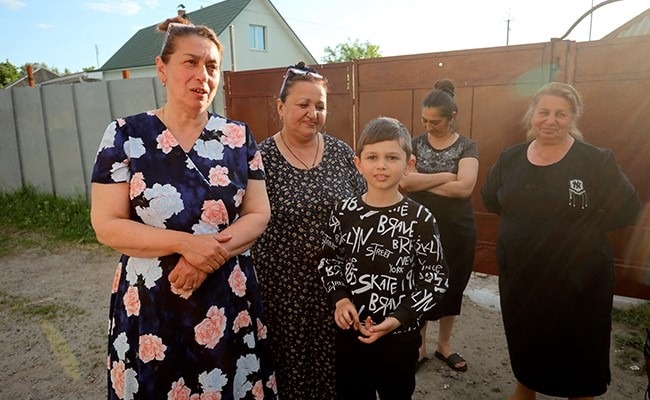| Translate This News In |
|---|
Lyudmyla was forced to flee the fighting and was promised that she would be rehoused in a town in western Ukraine by the authorities. They took one glance at her and turned her away when she arrived.
“It went well on the phone. The location of the room was decided upon by both of us. When I came, however, they refused to shelter me because of my dark skin “she expressed herself.
This 59-year-old Roma woman, who prefers not to share her last name, describes herself as a “success story” because she is one of the few members of her community with a high school diploma.
Her daughter, Ilona, is a lawyer, and she feels the same way.
They threatened to file a complaint if they were turned away, and only after a whole day of bartering did they get the keys to the room where they spent a month with Ilona’s mother-in-law and three children.
“We would have had to sleep on the street or in the railway station if I hadn’t been educated,” Lyudmyla explained after Russian forces withdrew from the area to focus on southern and eastern Ukraine.
Many Roma people in Ukraine, like her, claim they’ve had trouble finding refuge and receiving aid since the Russian invasion on February 24.
Complaints are uncommon.
According to census estimates, Ukraine has about 50,000 Roma, although rights groups estimate that the number is closer to 400,000.
“The largest issue is housing: no one wants to host Roma families,” says Julian Kondur of Chiricli, a Roma women’s assistance organisation established in Ukraine.
Long-held stereotypes against Roma people have fueled fear of them, he claims, as they do in many other countries.
Human Rights Watch charged Moldova on Wednesday of “deliberately sheltering most Roma migrants aside from those fleeing the crisis in Ukraine,” calling the action “unequal and discriminatory treatment.”
Chiricli has gathered several testimonies about what happened during evacuations through its hotline.
“A bus was about to leave (the northeastern city of) Kharkiv when the driver said no to a Roma family,” Kondur recalls.
“Sometimes, Roma themselves are so used to discrimination that they accept it as usual,” he says, adding that they hardly protest.
Lyudmyla first denied any discrimination to AFP before sharing her story.
Despite her difficulties in finding shelter in western Ukraine, Lyudmyla had granted safety to roughly 50 other Roma in her basement during the first two weeks of the war.
She remembered the anxiety and cold of those early days, dressed in a large flowery dress.
“Russian tanks and massive explosions could be heard ten kilometres away. It was quite frightening “she expressed herself.
And the weather was so chilly that one of her grandchildren became unwell.
We, too, are in pain.
Apart from the lack of solidarity expressed towards their community, Roma have also had difficulty accessing various sorts of aid due to a lack of proper documentation.
The Roma did not register with local authorities to avoid repression during the Soviet government, and many do not have identity cards, birth certificates, or passports to show citizenship.
“There was a saying at the time that if you don’t have a passport, you won’t have any troubles,” Kondur explains.
Many Roma people have moved to register since Ukraine’s independence in 1991, but over 30,000 have yet to do so, putting them at a disadvantage during the war.
He continues, “Inevitably, you need identity cards to collect food packages and to get cash support from the government and the UN.”
For all of these reasons, Roma “tend to seek support from inside their own community,” according to Valentina Zolotarenko, a mediator who assists Roma in obtaining public services.
“On television, only Ukrainians are shown, but we, too, are suffering,” the 59-year-old Russian native said.
“Despite the bombings,” she continues, “I would rather be a Ukrainian Roma than a Russian Roma.”
“For my community, it’s a lot worse there.”


















